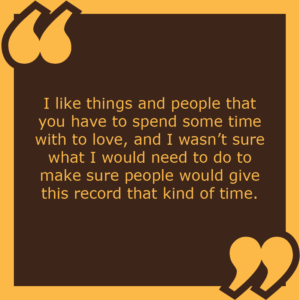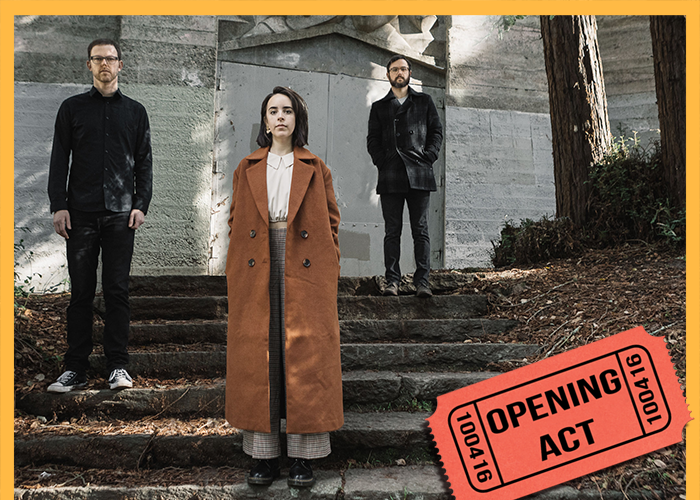 Artist: Billie Gale
Artist: Billie Gale
Latest Album: Imprint
Hometown: Oakland, CA
Members: Beth Garber, Adam Wayne, Eric Shawn, Justin Wayne
TrunkSpace: You released your debut album, “Imprint,” on September 20. What was it like to see that work – your art – spread its wings and fly off into the universe, where ultimately, you no longer had any control over it?
Garber: Putting the music out was a huge relief. The release of “Imprint” has been a long time coming and we went through many iterations of each song. By the time we finished mixing, we’d spent so much time editing and revamping, we were ready to start in on the next round.
It was harder for me to let go of the visual aspects. I collaborated with my friend Laura Elayne Miller on the artwork, and it took me a long time to feel done, with the art, with the title or with any part of the release that would influence people’s first impressions. The album is sad and serious, and pretty, and I had some insecurity about listeners dismissing the record before they had a chance to sit with it long enough to love it like I do. I like things and people that you have to spend some time with to love, and I wasn’t sure what I would need to do to make sure people would give this record that kind of time. That’s where I fear losing control. I feel inundated with the idea that all people want in this age is to be entertained, and it can seem as though the artists with the most success are those that push out content at an inhuman pace that does just that. So, I guess sending this super personal and sincere, raw collection out in to that world did feel like an exercise in faith. I think my greatest fear wasn’t rejection, but just indifference, getting lost in the noise. But the beauty of making something so authentic and personal is that you take so much joy in the work itself, you can lose sight of those kinds of fears. I’m working on that, getting sustenance from the work and not from the response. And people really do surprise you, and I’m really happy so far that so many people really love the record.
TrunkSpace: The album is so personal to you on so many different levels. At any point in the process did you feel like you were putting too much of yourself – and in the process, too much of yourself out into the world – in giving “Imprint” life?
Garber: Yeah, all my writing is deeply personal. I envy great songwriters who can take on another character, or create characters in their writing. For this album, I played with the idea of never even telling people a lot of the backstory; that so much of it is about the loss of my mom. I didn’t want sympathy to be the motivation for listening to the record. And people don’t often talk about how loss and grief can be so embarrassing. It’s inherently alienating. Everyone who knows you before and after a loss witnesses the readjustment, and it’s easier just not to address it most of the time. So, the nature of the writing being so personal was familiar for me, but talking about the writing was more of a challenge.
TrunkSpace: What could someone learn about you in sitting down to listen to “Imprint” front to back? What does it say about who you are, both as an artist and as a person, in 2019?
Garber: As a person, people might get a sense that I take everything a little too seriously. I do! I feel everything so keenly. It’s why I write. I have to dislodge all of that emotion, or else it kind of rots; gets heavy. It’s not comfortable for me to let feelings go uncharted. So there’s a therapeutic element to the way we write as a band. We’ve gravitated to each other because we all feel deeply, and I think that’s evident on the record.
TrunkSpace: “Imprint” pays tribute to your mother, who the band is also named after. Has this project and the songwriting associated with it helped you throughout the grieving process in ways that you may have not been able to tackle had you not had this creative outlet to fall back on?
Garber: Absolutely. Grief has a way of robbing you of your memory. Memory is shared, and someone like a parent holds memories on your behalf, remembers things about you that you’ll never be able to remember for yourself. Death is a division from that person, and the part of yourself they carry. The day after we had finished recording, it was like I’d woken up from a coma. I felt a surge of reconnection that was really in line with the concept of “Imprint,” the way connection continues in spite of that great death divide. I didn’t really set out to write a record about my grief, it just happened to be what I was thinking about most during the time that we were writing.

TrunkSpace: As the band now goes out into the clubs and supports the album, does it feel like you’re able to pass on your mother’s memory and legacy through these songs, and personally, does that give you comfort or can it be difficult to revisit them in a live setting?
Garber: Yes! The amount of work I have to do in order to book shows and to get people out, get all the gear loaded and make sure everyone is in good spirits, get the sound right, just all the details that go into getting this record in front of people can be so soul crushingly stressful, that once we get up to play I have to draw from something deep to make the performance real, worth all the work. Live music is so powerful because it’s never the same twice, you’re recalling something that you can’t really hold onto, and getting to know it in new ways all the time. So there’s new depth to these songs every time we play them, and I do feel really close to my mom’s memory because of that.
TrunkSpace: What are you most proud of with the album?
Garber: I love the extremes in this album, the interplay between the sort of beautiful, nurturing melodic elements and the errant, gritty, overpowering qualities. There are a couple songs like “Where Are You Now” that start with a whisper and get so big and gritty and scary, and raw. I feel really lucky that we were able to produce it in exactly the way we wanted, because in the moments of self-doubt, where I questioned a part being too long, or too sad, or too much, I could just look to the band and be like “it feels right, right?” We had nothing to lose in making this record, so we could really trust our gut, and I’m so glad about it.
TrunkSpace: Are you someone who is always creating, or can you turn off that part of your brain and step away from your songwriting self?
Garber: I have a harder time turning off the mathematical, logical part of my brain, so I usually write in two phases. First is a stream of consciousness, reckless, nonsensical time to get everything out. I don’t think in terms of chords, or rules, I search my guitar for what feels right. I have to give myself permission to let everything be sort of a mess. Then I sift through the voice memos and journal pages and edit. I love the refining as much as the expression. And it’s seasonal, I’ll have weeks or even months when I’m just writing, and then months when I’m just sorting through and putting the pieces together.
TrunkSpace: Where are you hardest on yourself as an artist?
Garber: Self-promotion is really difficult for me, and so much of being an artist is about commercializing what you do enough to get people in the door. I never wanted to sell anything, it’s not natural for me to sell what I make, but I recognize that it’s part of the deal. That being said, I’m waiting for the day when I can post up in the woods, write some more great records, and forget social media exists.
 TrunkSpace: Can you pinpoint the moment where you sort of found your songwriter’s voice and understood what kind of artist you wanted to be?
TrunkSpace: Can you pinpoint the moment where you sort of found your songwriter’s voice and understood what kind of artist you wanted to be?
Garber: Writing this record was that experience for me. I had been primarily a solo artist before starting this band, and over the course of writing the songs for this record and solidifying the band, I had the opportunity to write with a lot of great players and thinkers. I think collaboration, in whatever capacity is the only way to really find your voice. You have to get feedback, and you have people who will tell you to kill your most precious ideas. You don’t do that kind of self-sacrifice on your own. You get stuck in patterns of creating that aren’t even necessarily you, even if you’re used to them. I’ve found myself as a writer through conversation. I think it’s pretty cool that the content of the album is really about this too, the way we imprint on one another in some deep mystical ways.
TrunkSpace: Which would you prefer… writing one album that the world adores, or writer a career’s
worth that a select group of people connect with?
Garber: A long career, no question, there’s no way of knowing what you’re capable of creating otherwise, and over time, hopefully, that select group diversifies as you evolve. Besides, I think the only real safeguard against the delusion of self-grandeur is to continue producing work and putting it out. Success to me is access to the critical eye of artists I admire. I just want to know if what we’re making is good, and, if not, how to make it better. But then, there’s a part of me that knows I’ll keep writing and putting out music whether it’s good or not. I can’t help it.
TrunkSpace: Time machine question. If you could jump ahead 10 years and get a glimpse of what your career looks like a decade from now, would you take that journey? If not, why?
Garber: Absolutely. I’m so curious what we’ll sound like in 10 years!


